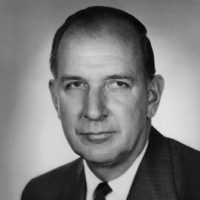
Richard E. Shope
The Rockefeller University (Rockefeller Institute)
For original contributions to understanding infectious diseases in animals and man and the discovery of new microbiological principles.
It is rare indeed that any man introduces even one truly new scientific principle, yet to Richard Shope the world owes many. His discovery of the virus of swine influenza has been not only of great economic importance in animal husbandry, but it led English workers to search for and find the virus of human influenza. He further demonstrated that swine influenza is a complex infection, the virus and a bacterium acting together.
His discovery of the cause of the rabbit papilloma which now bears his name showed that a mammalian neoplasm can be induced by a virus, and gave fresh impetus to research being done to test the role of viruses in the causation of tumors generally, including those of man.
Early in World War II, our government gave him the task of finding a vaccine against cattle plague because of the possibility that the disease might be introduced into this country. The vaccine Shope devised has been used to protect millions of cattle in other parts of the world. For it, he was given the Legion of Merit.
Later in World War II, when working in Guam, he discovered a fungus from which he obtained the first antibiotic with antiviral properties. Although the fungus later lost the ability to form this agent, its discovery has shown beyond doubt that antibiotics to combat viral infections are a possibility, and this fact has given impetus to an enormously important area of research.
Recently he has identified several new viral diseases among deer and other wild animals, and has added to his list of new principles by discovering that the virus of swine influenza is transmitted to other pigs through worms which serve as its intermediate host. For his contributions to knowledge of animal diseases, he has been awarded two honorary degrees in veterinary medicine.
